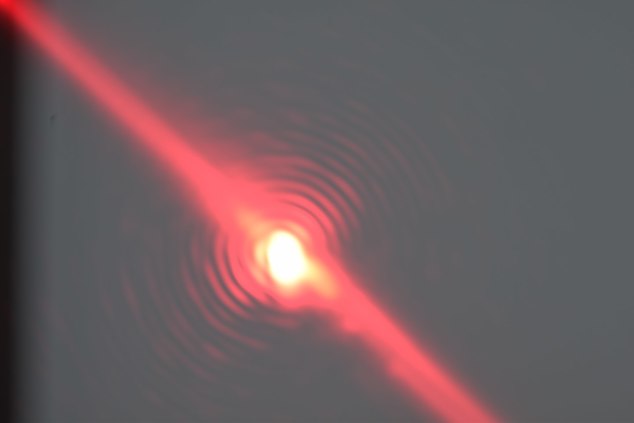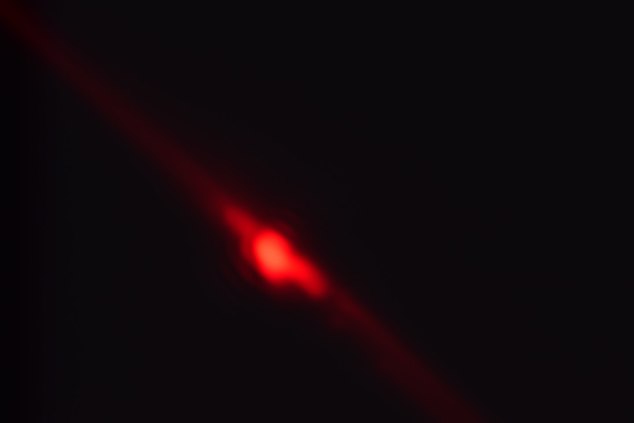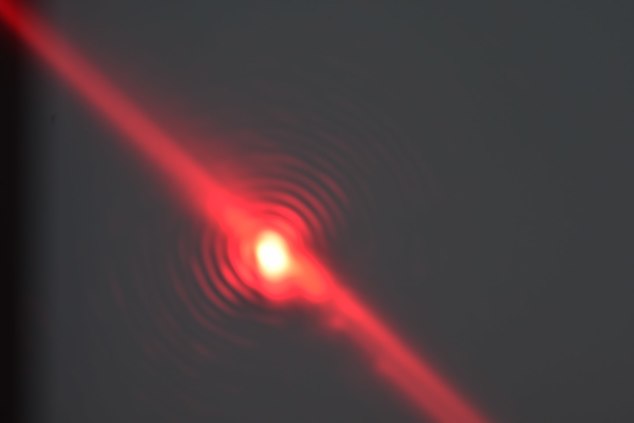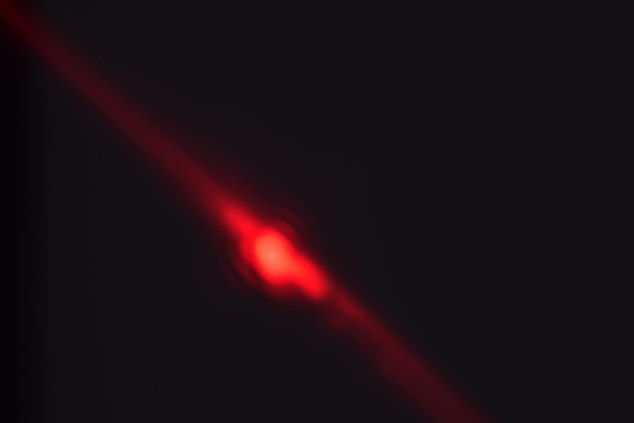-
 VagabondSpectre
1.9k1. You might be right concerning the fact that with current telescopes we can see planets rotate. I honestly wouldn't know but I am willing to take your word for it.
VagabondSpectre
1.9k1. You might be right concerning the fact that with current telescopes we can see planets rotate. I honestly wouldn't know but I am willing to take your word for it.
Please do not forget that we are talking about the 17th century, and I do not think that the telescopes then, which were no better than cheap binoculars, would be capable of such a feast. — Hachem
1: They had a few large telescopes in the 17th century, but again, we don't need to identify rotation, we just need to identify the lunar emergence from behind Jupiter.

2: It means that there is a continuous flow of photons, and the "snap-shot" effect you're trying to describe is a mere consequence of us actually taking snap-shots. No such effect has been demonstrated to exist or to be the cause for the variations in eclipse duration of Jupiter's moon.
3: The distinction between parallax and resolution is not artificial, they're two completely different phenomenon. I've explained what they both are and asked you how they could possibly be responsible for differences in measured eclipse duration. "There are no intermediate states" is demonstrably false with more and better measuring equipment...
Vagabond Spectre wrote: Parallax and resolution are not the same thing, and parallax has little or nothing to do with this experiment. Parallax is the apparent motion of objects due to changing perspectives of observation, which unless you can correct me has nothing to do with visible light after the emergence of Jupiter's moon following an eclipse. Resolution is not an issue either, as we do not need to see Jupiter's moon with any high degree of detail whatsoever, we just need to see when the light from it becomes visible after it's emergence from behind Jupiter.
4: I'm not going to dig through any thread but this one. Take responsibility for your own position and at the very least quote yourself. I don't recall where you pointed out any light phenomena that the current model cannot explain, not do i recall where you actually presented a theory of your own which was explanatory or predictive in any way. Please present the evidence for your own claims. "I've already presented it" is lazy and self-deceptive.
5: Due to the expansion of space described in the current cosmological model, over very great distances light is essentially stretched out as the space between photons expands. This is what actually gives rise to a definitive edge of the observable universe, because at sufficiently large distances the cumulative expansion of space exceeds the ability of light to ever reach the other end (like a road that grows faster than you can traverse it, you will never get to the end). This comes from Einsteins special and general relativity, both of which have been demonstrated to have stunning predictive power.
Concerning the first part of this quote, this is as far as I can see an argument in my favor. We are capable of seeing objects as they really are, therefore with no delay. You reaffirm the idea by stating "bigger telescopes mean more resolution" which seems to indicate that we see distant objects as they are. I am curious as to how you reconcile the idea that telescopes give an accurate image of reality with the principle that it takes time for light to reach us (on that we agree), and that therefore the images we see represent an image of a moment in the past. All I am saying is that we are not looking at the past but at the world as it is now, and that is the puzzle we have to solve. — Hachem
Seeing an object with greater resolution doesn't mean we're also seeing them with less delay. That assumption doesn't follow from any logic I'm aware of.
why do you think better resolution means less time delay? -
 Hachem
384
Hachem
384
This has also been asked by VagabondSpectre. Maybe it seems obvious only to me, but greater distance blur objects, or points together. A simple example are two mountains that appear to be one from a distance, Craters on the moon that are kilometers wide and which are projected in much smaller images with the concomitant loss of details. That means in the case of eclipses or reappearance of moons from behind Jupiter that greater distances would make it more difficult for an observer to pinpoint the moment of disappearance or reappearance. I am sure it represents no problem now, telescopes are powerful enough for us to see the moons peeking from behind Jupiter. After all, if we can see the planets rotating, that should not present any difficulty.
I would be interested to know if Rømer's experiment have been re-done and what the results are. I mean the experiment itself whereby the exact times of eclipse and reappearance are compared, taking into considerations all relevant factors. If is has already happened I would appreciate a link or a reference.
@VagabondSpectre I may expect you to do your homework and referring to where I have handled some other matters is certainly not deceptive.
Also, size does not always matter, and the nice picture you show does not say anything about the quality of the lenses at that time.
I realize I have not answered all objections, but I will try sometimes later. -
 Hachem
384This is a photograph taken with the bare body of a digital camera on a tripod. A red laser pen is directed into the camera, very close to the center, from a distance of more or less 2 meters. The shutter speed is 1/60s. Notice the strong resemblance with my other pictures taken with a pinhole lens, and examples given by others.
Hachem
384This is a photograph taken with the bare body of a digital camera on a tripod. A red laser pen is directed into the camera, very close to the center, from a distance of more or less 2 meters. The shutter speed is 1/60s. Notice the strong resemblance with my other pictures taken with a pinhole lens, and examples given by others.

Here is the last of a series of six taken at the fastest shutter speed my camera can manage: 1/4000s.
You will notice that the rings become less and less visible.

It would be difficult to claim that diffraction has anything to do with the way the image is. The opening of a camera body is huge relative to the different wavelengths of light, and so is the sensor area.
This reinforces me in my conviction that what we are looking at is the image of the laser itself, but I am certainly open to suggestions. -
 Hachem
3842: It means that there is a continuous flow of photons, and the "snap-shot" effect you're trying to describe is a mere consequence of us actually taking snap-shots. No such effect has been demonstrated to exist or to be the cause for the variations in eclipse duration of Jupiter's moon. — VagabondSpectre
Hachem
3842: It means that there is a continuous flow of photons, and the "snap-shot" effect you're trying to describe is a mere consequence of us actually taking snap-shots. No such effect has been demonstrated to exist or to be the cause for the variations in eclipse duration of Jupiter's moon. — VagabondSpectre
You interpret "snap shot" as meaning a discontinuous flow of photons. I agree with you that it is highly unlikely. But then I do not think we see objects because of what had been called photons.
A central tenant of light theory is a straight beam carried by waves, and supported at the sides by wavelets. The Huygens Principle, fine tuned by Young, Fresnel, Maxwell and others is supposed to explain how light can go on indefinitely, and also how we see objects.
A simple refutation of the Huygens Principle I have dealt with in this discussion and the other one mentioned is the fact that we can see objects even when no visible light rays are entering our eyes.
We can see them from a completely dark corner, and therefore also from aside. I do not know how that is possible and what creates this "lateral" perception, but the Huygens Principle and the theory of light cannot account for it.
Maybe other electromagnetic waves than visible light are making it for us possible to see objects even when there is no light ray reaching our eyes. But then, if we can see objects whose light is directed away from us, the so-called wavelets that are supposed to sustain the main wave must use energy in all the other directions, weakening the main wave.
In fact, it is probably what is happening when we consider the fact that visible light weakens with distance until it disappears from sight altogether.
I have given many examples of this kind and I did not get any answer from all the objectors. But I have not lost hope yet. -
 Hachem
384
Hachem
384
3. We disagree on the differences and similarities between resolution and parallax, but we agree on the fact that resolution is involved when looking at the moons of Jupiter to determine the exact moment of their eclipse or reappearance. Maybe we should concentrate on that. -
 Hachem
384Faster than the speed of light?
Hachem
384Faster than the speed of light?
My theory, or rather my raw intuition, will be easily falsifiable. Imagine two observers, one near Earth, the other on Mars, looking at each other through powerful telescopes.
They can see when their colleague millions of kilometers away raises a board with a number on it. They must then raise a board, or type a number which shows up on an electronic board, a number that is one higher than the number they saw, or whatever formula they have agreed upon.
They will immediately be able to determine how fast the information has reached the other side. My prediction is that they will see it immediately, even though any other form of communication between Earth and Mars will be much slower than the speed of light.
edit: They could even play chess, like the characters in one of the sequels of Resident Evil. But they will have to acknowledge which move they have received from their opponent as soon as they see it. -
 Hachem
384Here is an intermediary phase. This picture has been taken with 1/500s
Hachem
384Here is an intermediary phase. This picture has been taken with 1/500s

And this one with 1/2000s.

edit: If you take a thin band of the central spot and the different rings, you will see that it is the same result as the one shown by two-split experiments and other images used to prove the wave theory of light.
edit2 The large oblique beam is I think the result of back and forth reflections of the prism that directs the image to the viewer. But I am not really sure. -
 Banno
30.6kThat means in the case of eclipses or reappearance of moons from behind Jupiter that greater distances would make it more difficult for an observer to pinpoint the moment of disappearance or reappearance. — Hachem
Banno
30.6kThat means in the case of eclipses or reappearance of moons from behind Jupiter that greater distances would make it more difficult for an observer to pinpoint the moment of disappearance or reappearance. — Hachem
The point of using Io was that the reappearance is obvious and effectively instantaneous. But anyhow, given that the relevant time difference between eclipses were in the order of minutes, a second or two would make no difference to the calculation. -
 Hachem
384
Hachem
384
I am afraid you are wrong. Romer's calculations were based on the average of observations made over 10 years! So it was a matter or seconds, or even less!
edit: it always looks instantaneous. One moment Io is indistinguishable from Jupiter, the next it is. That is the whole point in fact. -
 Hachem
384Yes, that is right. His argument is, as far as I can see, wrong. That does not mean that he is wrong about the idea of light speed being finite. I hope you can make the distinction between both positions.
Hachem
384Yes, that is right. His argument is, as far as I can see, wrong. That does not mean that he is wrong about the idea of light speed being finite. I hope you can make the distinction between both positions.
Here is another example of bad argumentation that has always been considered valid while it is wrong logically.
https://philpapers.org/post/20762
https://philpapers.org/post/20890
https://philpapers.org/post/21002 -
 Hachem
384Destructive Interference?
Hachem
384Destructive Interference?
Look at the image on the screen that the M.I.T professor uses as a proof of destructive interference.
https://youtu.be/RRi4dv9KgCg?t=94
His argument is that by pushing on the plate he changes the distances between the screen and the dark and bright rings of the image, making them alternate. Those black rings are according to him the result of destructive interference. The problem is that in my experiments bright rings did not suddenly black rings when I changed the position of the laser. So, what the professor might be showing is simply two alternate images in time and space that give the impression that black has turned red, and vice versa. -
 Hachem
384How are lasers made?
Hachem
384How are lasers made?
Look at this image and tell me what it reminds you of.
https://youtu.be/qkQo6gig3tQ?t=55 -
 Banno
30.6kLet's stay on one topic.
Banno
30.6kLet's stay on one topic.
The point of using Io was that the reappearance is obvious and effectively instantaneous. But anyhow, given that the relevant time difference between eclipses were in the order of minutes, a second or two would make no difference to the calculation. — Banno
I am afraid you are wrong. Romer's calculations were based on the average of observations made over 10 years! So it was a matter or seconds, or even less! — Hachem
In fact the maximum delay was sixteen and a half minutes later than would have been expected if the speed of light were infinite. — Banno
Again, a difference of even a few seconds, as might (conceivably, but I doubt it; having seen the such eclipses myself, I can vouch for their astonishingly instantaneous appearance) result from an issue with the resolution of the telescope being used, would have made little difference to the result.
So I suppose I have misunderstood your argument. Can you explain it to me with a bit more clarity? -
 Banno
30.6kThe question is whether the differences in the times of eclipse and reappearance of the moon cannot be interpreted differently, without involving the idea that it takes time for light to travel through space. We all know that when looking through the telescope at a planet like Jupiter, we do not see it rotating about its axis, or orbiting the sun. We get each time a snapshot of a frozen moment in time, and the changes to the images we receive occur in jumps without any intermediate states. This is understood as the effect of parallax, or more simply resolution. Because of the distance two points separated by relatively large distances will appear to our perception as one, and it takes time before we notice the difference between one position and another. — Hachem
Banno
30.6kThe question is whether the differences in the times of eclipse and reappearance of the moon cannot be interpreted differently, without involving the idea that it takes time for light to travel through space. We all know that when looking through the telescope at a planet like Jupiter, we do not see it rotating about its axis, or orbiting the sun. We get each time a snapshot of a frozen moment in time, and the changes to the images we receive occur in jumps without any intermediate states. This is understood as the effect of parallax, or more simply resolution. Because of the distance two points separated by relatively large distances will appear to our perception as one, and it takes time before we notice the difference between one position and another. — Hachem
This seems to be the core of your 'argument'; but it remains oddly opaque. I know that I can see the rotation of Jupiter's red spot through even my modest telescope; although it is certainly not as bright as when I was a child. One does not see a series of snapshots. But even if one did, it is not clear why one would conclude that the changes to Jupiter occur without any intermediate state. Nor is it clear how this relates to parallax, nor to resolution - which, as has been pointed out, are two quite distinct things.
Perhaps one should conclude that this is not an argument at all. -
 Hachem
384It is in fact quite simple. If you see it happening, then it is not a matter of "snapshot". Let us say you are looking at Jupiter and you see the moon disappearing or appearing. In this case, it would be like looking at a large object slowly being drawn behind a curtain, or from behind a curtain. No snapshots involved. If that is more or less what you see then I can only say that you are completely right.
Hachem
384It is in fact quite simple. If you see it happening, then it is not a matter of "snapshot". Let us say you are looking at Jupiter and you see the moon disappearing or appearing. In this case, it would be like looking at a large object slowly being drawn behind a curtain, or from behind a curtain. No snapshots involved. If that is more or less what you see then I can only say that you are completely right.
For Romer, the situation was different, the differences between one observation and the other where probably more snapshot like. One moment Jupiter was alone, the other, there was a moon beside it.
Like when you are looking at somebody approaching you and you suddenly recognize the person. It would be very difficult to pinpoint a moment where that happened. And that is made even more difficult when large distances are involved. I would certainly like to avoid the resolution-parallax discussion again, what matters is that it takes longer for two objects which are very far away to appear as two objects, and not as one.
That is why I consider his conclusion that the speed of light is involved not as irrefutable.
Just as for Bradley, nobody is really interested in the correctness of the argumentation, it would be considered more like a historical curiosity.
I have a vested interest in showing that the wave theory of light is not as impregnable as one thinks, that is why I took time to analyze old texts and experiments like that of Romer, Bradley and others.
The images I have taken are also completely on topic. They show that another interpretation is possible of light phenomena that have always been considered as strong proofs for the correctness of the wave theory. -
 Banno
30.6kThere is a very neat simulation at http://demonstrations.wolfram.com/RomersMeasurementOfTheSpeedOfLight/
Banno
30.6kThere is a very neat simulation at http://demonstrations.wolfram.com/RomersMeasurementOfTheSpeedOfLight/ -
 Banno
30.6kLet us say you are looking at Jupiter and you see the moon disappearing or appearing. In this case, it would be like looking at a large object slowly being drawn behind a curtain, or from behind a curtain — Hachem
Banno
30.6kLet us say you are looking at Jupiter and you see the moon disappearing or appearing. In this case, it would be like looking at a large object slowly being drawn behind a curtain, or from behind a curtain — Hachem
Because of the distances involved, Io is effectively a point source. So it is not at all "like looking at a large object slowly being drawn behind a curtain"; it is instantaneous. I invite you to check this out for yourself; all you need is a small telescope or even a decent pair of binoculars. There's one today: 21:14 UT, Io exits eclipse by Jupiter's shadow. (see http://www.skyandtelescope.com/wp-content/observing-tools/jupiter_moons/jupiter.html) -
 Hachem
384
Hachem
384
Simulations are very often, as in this case a pedagogical instrument.
Once again, I do not doubt that the speed of light is finite, even though I doubt that light, visible light, travels through space. I consider light as a local phenomenon caused by something which I will call, because I do not have any better alternative, electromagnetic waves, that probably travel through space.
I therefore believe that we see illuminated objects there where they are, and not because their light travels to us, which I find very improbable. We would have to explain how light turns visible, then invisible, and again visible. I still have to see convincing arguments for that which do not rely on my faith in science (which by the way remains strong). -
 Hachem
384Again, differences of a second or two would have negligible impact on a demonstration involving minutes. Issues of resolution or parallax would not result in such large delays. — Banno
Hachem
384Again, differences of a second or two would have negligible impact on a demonstration involving minutes. Issues of resolution or parallax would not result in such large delays. — Banno
What you do not seem to accept is that those differences are based on observations. In other words on the fact that observers (or devices) are able to distinguish one object from another. And that in itself depends on distance and resolution, and yes, even parallax.
Your whole argumentation, as was Romer's, is to consider the fact of observation as beyond any discussion. Once you reject this premise the whole argumentation falls in the water.
Welcome to The Philosophy Forum!
Get involved in philosophical discussions about knowledge, truth, language, consciousness, science, politics, religion, logic and mathematics, art, history, and lots more. No ads, no clutter, and very little agreement — just fascinating conversations.
Categories
- Guest category
- Phil. Writing Challenge - June 2025
- The Lounge
- General Philosophy
- Metaphysics & Epistemology
- Philosophy of Mind
- Ethics
- Political Philosophy
- Philosophy of Art
- Logic & Philosophy of Mathematics
- Philosophy of Religion
- Philosophy of Science
- Philosophy of Language
- Interesting Stuff
- Politics and Current Affairs
- Humanities and Social Sciences
- Science and Technology
- Non-English Discussion
- German Discussion
- Spanish Discussion
- Learning Centre
- Resources
- Books and Papers
- Reading groups
- Questions
- Guest Speakers
- David Pearce
- Massimo Pigliucci
- Debates
- Debate Proposals
- Debate Discussion
- Feedback
- Article submissions
- About TPF
- Help
More Discussions
- At the speed of light I lose my grasp on everything. The speed of absurdity.
- If max speed of light (C) is constant does that mean distance measurements are consistent?
- Did the "Shock-Wave" of Inflation expand faster than the speed of light?
- Do Physics Equations Disprove the Speed of Light as a Constant?
- Other sites we like
- Social media
- Terms of Service
- Sign In
- Created with PlushForums
- © 2026 The Philosophy Forum






